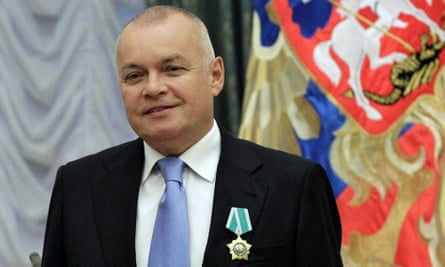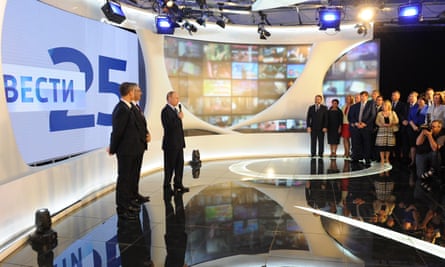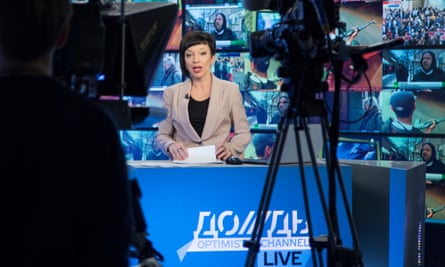When three senior editors resigned from one of the last independent publications in Russia last week, it was condemned as yet another sign of the mounting pressures on journalists under president Vladimir Putin’s rule.
According to insiders, the resignations came as a result of coercion from the Kremlin after anger over several recent investigations, including reports on the Panama Papers revelations.
The head of the International Federation of Journalists, Jim Boumelha, described the resignations as “not only a loss for the RBC but also a major blow for press freedom”, adding that censorship was putting journalism, and journalists, at risk.
Many fellow editors and reporters at RBC say they plan to resign too, while others have vowed to continue their work “until the first story is censored”.
But RBC is not the first media organisation that has faced serious pressure to conform to Kremlin narratives. Since Putin began his re-election campaign in 2011, 12 prominent newsrooms have battled resignations, restrictions and closures.
Here’s what happened, and where they are now:
RBC - May 2016

Allegedly as a result of pressure from the Kremlin (which Putin’s spokesman, Dmitry Peskov, firmly denies), the news company lost its three top editors: Elizaveta Osetinskaya, Roman Badanin and Maxim Solyus.
It’s too soon to say who will replace them, or what kind of relationship the next editor will build with the Kremlin and RBC’s liberal owner, Mikhail Prokhorov.
When leaving his post, Soluys pointed out that police recently brought fraud charges against Nikolai Molibog, RBC’s general director, making it unlikely that Prokhorov will escape this conflict unscathed.
Forbes - January 2016
Because of a new law restricting foreign ownership in Russian media companies, the German group Axel Springer was earlier this year forced to sell off its shares in Forbes and other assets held in Russia.
Negotiations with potential buyers lasted several months. Initially, it was assumed that 20% of the company would remain with general director Regina von Flemming, preserving a certain level of continuity with the previous owner.
But the deal fell through, and businessman Alexander Fedotov ended up buying 100% of Forbes in Russia instead. The chief editor, Elmar Murtazaev, then quickly left the organisation in mid-January, citing “personal reasons”.
After Murtazaev’s departure, Forbes hired Nikolai Uskov, a journalist with little experience in business reporting, as its chief editor. He quickly announced that under his stewardship, Forbes wouldn’t be about politics, though he vowed to remain “a thorn” in the side of the powerful.
Russian Media Group – August 2015
In the summer of 2015, Vladimir Kiselyov, the founder of the Federation Foundation, a pro-Kremlin NGO, suggested the creation of a “patriotic media holding company” to Putin.
Kiselyov proposed merging “several television stations” and Russian Media Group (RMG) assets, such as Russkoe Radio, Hit FM, Radio Maxim, DFM, Monte Carlo and the music station Ru.tv.
RMG, owned by a holding company, would then be sold to Gosconcert, part of the Russian Ministry of Culture.
A consortium of managers, producers, and artists tried to buy out the owners, investment fund IFD Capital, but failed. In August, the holding company appointed a new executive director but he quit after a week, complaining about interference from the Ministry of Communications in the company’s editorial policies.
In autumn, much of the staff at RMG, including most of the employees at Russkoe Radio, resigned.
Today, the sale of RMG to Gosconcert is still being negotiated.

TV2 - February 2014
In late 2014, the Tomsk-based TV station, TV2 – one of the oldest independent television networks in Russia – was suddenly in danger of being shut down.
Loyal viewers speculated it was because of its independent editorial policy. Tomsk residents even hosted a mass rally in support of the station, just as its shows were terminated by the agency in charge of broadcast licences. Internet and cable broadcasting ceased soon after.
In February, TV2 launched a fundraising effort to keep the channel alive on the internet. An NGO called Sreda, a charity supporting independent media, art and sciences, came to the rescue and announced that it was giving TV2 a 7.5m rouble grant. Today, the station exists as an internet project and continues to produce video content online.
Russkaya Planeta - December 2014
One day in 2014, investors at Russkaya Planeta, an online news service, suddenly announced that chief editor Pavel Pryanikov was out, and new leadership would be moving in.
Apparently due to one of the investors’ interests in “Russian cosmism”, the editors were told their staff was “weak cosmists”, and not up to the journal’s tasks. They were let go, and the site was redesigned.
Along with Pryanikov, who managed to transform Planeta into one of Russia’s most original publications, several other editors left, saying the change in leadership was part of an effort to overhaul the journal’s editorial policy.
Lots of reporters have since left the journal, which has become a patriotic media outlet, publishing articles about Russian weapons, op-eds by nationalists commentators and criticism of the Russian opposition.
Pryanikov ended up as chief editor of the website Takie Dela, a media outlet launched with the support of a Moscow charity foundation.
REN TV - August 2014
In August, the network shut down The Week with Marianna Maksimovskaya, one of the last remaining analytical political programmes on Russian television. According to research data, it was also one of the most popular shows on REN TV, but the station never offered a reason for cancelling the program.
After the news broke, Maksimovskaya briefly remained at REN TV as a deputy editor, but eventually resigned in December 2014.
The station has since replaced Maksimovskaya’s show with a new program called Dobrov on Air, hosted by Andrei Dobrov, who claims to present the news “from a normal person’s perspective”.
Grani.ru - March 2014
In March, Russia’s attorney general ordered federal censors to block the opposition website Grani.ru, accusing it of publishing “incitements to illegal action”, including unsanctioned political rallies.
Grani.ru was the first online news publication to be blocked in Russia, but it soon had company as the opposition websites Kasparov.ru and Ezhedvevnyi Zhurnal, were blocked for the same reasons.
The site, which was struggling financially even before being taken down, continues to operate using an array of mirror sites, and hosts instructions for circumventing internet censorship. Though it still publishes reports about current events, its content is exclusively political.

Lenta.ru - March 2014
Also in March, not long before the annexation of Crimea, the managing shareholder of the company Afisha-Rambler-Sup, Alexander Mamut, fired the chief editor of Lenta.ru, Galina Timchenko.
The reason given for the dismissal was an official warning from Russian state censors, issued because one of the website’s stories (an interview with a Ukrainian nationalist leader) contained a hyperlink to materials deemed extremist.
More than 80 editors and reporters – nearly the entire newsroom – quit in protest, publishing an open letter calling Timchenko’s outster “an act of censorship” and a violation of Russia’s media laws.
Lenta.ru’s next chief editor was Alexey Goreslavsky, the former chief of the pro-Kremlin website Vzglyad, where he had primarily managed the company’s relationships with various government offices.
As a result of this decision, the staff who resigned went on to found the media outlets N+1 and Meduza, as well as a social media marketing firm called Fuzzy Cheese. Other reporters went on to find work at Forbes, RBC, Vedomosti and Arzamas.
Dozhd TV - January 2014
At the start of the year Dozhd, an opposition television station, published an online survey asking viewers if Leningrad should have been surrendered to the Nazis “in order to save hundreds of thousands of lives”.
Afterwards, Russia’s biggest cable television providers started, one after another, dropping Dozhd from their coverage, saying it was in response to angry calls from customers upset about the Leningrad poll.
Dozhd’s chief editor, Natalia Sindeeva, accused the cable providers of bowing to pressure from above, saying these companies admitted as much to her in private conversations. According to Sindeeva, Dozhd was being punished for reporting on high-ranking officials’ luxurious country homes, not the Leningrad poll.
Before the end of the year, the station was evicted from its studio in downtown Moscow, though it has continued to broadcast, even operating temporarily out of a private apartment for several months.
Dozhd has since been forced to change its business model, shifting its focus to broadcasting online to paid subscribers.

RIA Novosti - December 2013
On the 9 December 2013 Putin unexpectedly issued an executive order liquidating Russia’s largest news agency.
With Putin’s decree, the state, which owns RIA Novosti, set about building an entirely new news organisation in its place. The new outfit was called Rossiya Segodnya (the Russian translation of “Russia Today”), and Dmitry Kisleyov, the country’s best known pro-Kremlin commentator, was appointed as general director.
In the remaking of RIA Novosti – once the most innovative and independent of Russia’s state media – most of the correspondents left, many of the agency’s news projects shut down and layoffs swept the newsroom.
Some of its products, such as the legal news desk Rapsi and the foreign news translation portal, InoSMI, survived as separate projects.
Though the original URL Ria.ru still works, the website is just an appendage of Rossiya Segodnya.
Gazeta.ru - September 2013
Before parliamentary elections in 2011, Roman Badanin resigned from his post as deputy editor of Gazeta.ru, after the website’s managers decided to remove a banner created jointly with a human rights organisation featuring a project to crowdsource reports of election violations.
Mikhail Kotov, Gazeta.ru’s chief editor, said removing the banner was a purely commercial decision. However other publishers alleged the conflict was due to Badanin’s refusal to run an advertisement for Putin’s political party, United Russia.
After the elections, the holding company that owned Gazeta.ru was transferred entirely to Alexander Mamut, a businessman who owns several other media outlets. By September 2013 Gazeta.ru had completely restaffed its politics desk, while many of the reporters who had covered the 2011 and 2012 elections had resigned.
Kommersant - December 2011
On the 16 December 2011, the Kommersant publishing house fired Maxim Kovalsky, the longtime chief editor of the daily Kommersant-Vlast.
The reason for Kovalsky’s dismissal was his decision to publish a photograph of a voting ballot featuring an obscene word scribbled next to Putin’s name. Both Kommersant’s owner, the billionaire Alisher Usmanov, and Demyan Kudryatsev, the head of the Kommersant publishing house, publicly criticised the photo.
Staff at the newspaper wrote an open letter supporting Kovalsky, calling his ouster an “act of intimidation”.
But Kovalsky’s dismissal wouldn’t be the last time Kommersant found itself in hot water. Twice, in 2012 and 2013, Kommersant FM radio station lost its chief editors under rumoured pressure from the Kremlin.
Despite the frequent turnover of editors and publishers since then, Kommersant remains one of Russia’s largest media holdings, though its executive managers increasingly face accusations that they meddle in the newspaper’s stories.
A version of this article first appeared on Meduza.ru

Comments (…)
Sign in or create your Guardian account to join the discussion